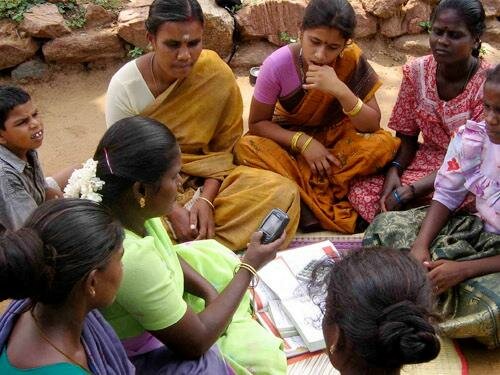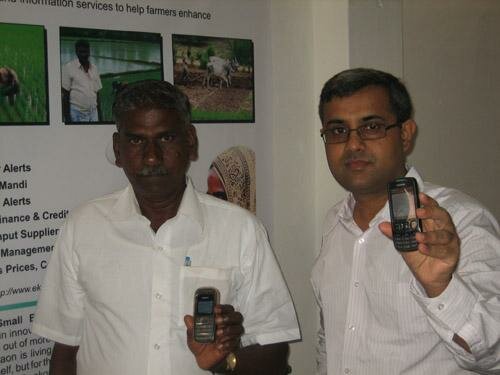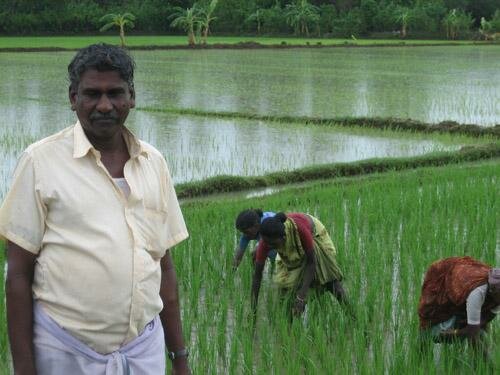The Village is Logging On
Along with ploughing, irrigation, harvesting and threshing, farmers in India are adding logging on to their daily list of chores on the farm.

What did you last use your mobile phone for? To return a call to a friend? Or maybe to send a text message? Perhaps you confirmed a dentist’s appointment or booked a table at a sushi bar? What I doubt you would have done is use your mobile to find out the germination times for seeds, or when to plant them, what soil they prefer, how to prepare the land for sowing or to get a 10-day forecast of the weather patterns in the plains. The inception of Ekgaon, which means “One Village” in Hindi, has meant that rural farmers in India are now using their mobile phones to do all this, plus get access to mobile financial services like they have never been able to do before.
The brainchild of founders Vijay Aditya and Tapan Pharik in 2002, Ekgaon Technologies is a pioneer in mobile communications technology that offers a rural agricultural advisory package and accounting services that are rapidly changing the way pastoral India is doing business.
In conversation, CEO Vijay speaks with an equable stoicism which belies his focused ambitions for Ekgaon. It may be a throwback to his youth, when you’d most likely find Vijay sitting in the back row of the classroom, keeping as low a profile as he could during lessons. For a soft-spoken individual who claims to have been an introvert as a youngster and averse to adventure, this man has guts.
…he envisages a customer base of 2 million in India by the end of the financial year and 15 million in South Asia and Africa in the next five.
Ekgaon’s current list of subscribers for financial services who pay INR120 for a cyclical three-month agricultural advisory package, is inching its way to the 1 million mark and Vijay has set his sights high for the company. Dependent on investor financing which he is actively seeking, he envisages a customer base of 2 million in India by the end of the financial year and 15 million in South Asia and Africa in the next five. While he’s at it, he says a public offering within the next seven years is doable if he can convince new investors to dig deep in their pockets.
Both in his personal life and professionally, Vijay is the quintessential reluctant non-conformist. Armed with an electrical engineering degree and a Master’s in management, he chose the path of social entrepreneurship rather than settle for a “stable and comfy” 9-to-5 job in management. “My parents thought I’d gone quite crazy in making that choice,” he chuckles. His refusal to accept the status quo has also made him a fierce advocate of the simple rural worker, who he says he admires greatly. “The way they are able to adapt to their circumstances is remarkable,” he enthuses, adding that villagers are better placed to know their needs than anyone else.

But the potential for creative ideas and problem-solving has never been far from the mind of this far-sighted change-maker who cites Mahatama Gandhi’s ideal of Gram Swarajaya (village self-rule) as the most natural way for the holistic development of a nation and a world.
In Vijay’s world, social entrepreneurs must start with the assumption of competence among the common man or woman who he feels are best placed to unleash the resources from within their own communities – working from the ground up, so to speak.
Ekgaon’s focus centers on the ideal that rural communities deserve access to the new knowledge economy just like the rest of us, to get things done and improve their lot. “The knowledge revolution, like the industrial revolution, threatens to exclude vast segments of the population,” he warns. And getting these communities onboard means giving them the means to escape the lack of basic infrastructure and a cycle of goodies and handouts which history has shown don’t make a real difference to people’s lives.
You won’t find this man waiting for under-represented communities to inherit the earth. As adaptive and resourceful as they are, Vijay refuses to call his rural subscribers “poor”; neither does he believe in the power of religion to solve what ails the world. “Faith has its place but you have to be the change, in order to effect change,” says Vijay, quoting a Gandhi’esque patois. Still, a little insurance is always savvy business practice. He reminds me that his mother prays on his behalf in “all the temples of the world”, so she has him covered in the event his poignant vision for the world misses the celestial nod.


















